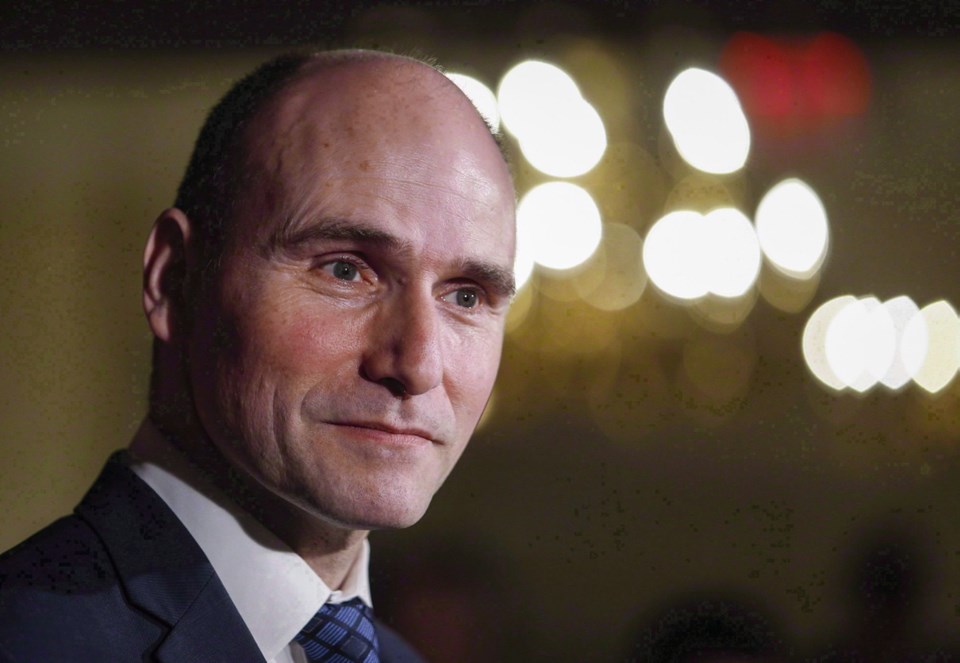The federal government will invest $75 million to fund 1,500 affordable housing units in B.C.
The funding, to be made available over the next five years starting this month, will fund construction of 1,000 supportive housing units and 500 units for women and children.
In making the announcement Tuesday in Victoria, Jean-Yves Duclos, federal minister of Families Children and Social Development, said B.C. is facing a housing crisis that threatens the ability of vulnerable Canadians to feel secure. Duclos said the funds should start flowing relatively quickly
B.C. NDP MLA Spencer Chandra Herbert, who was representing the province at the announcement, said the funds will go to support affordable housing the province is building.
“So what this does is unlock additional dollars to build more homes on top of what we are already building,” he said.
Chandra Herbert said in the last two years the province has built or is currently building 21,000 affordable housing units as part of its $6.6-billion Homes for B.C. housing program. The intention is to build 114,000 affordable units by 2028.
It is unclear where the extra units, fueled by the $75 million investment, will be built.
Chandra Herbert said that will depend on which projects apply to access the funds. “It’s a first-come, first-served basis,” he said.
Victoria Mayor Lisa Helps said she hopes some of that funding will find its way to projects in Greater Victoria.
“It’s fantastic to see the federal government investing more money into B.C. The need is great,” she said. “The CRD housing needs assessment shows that by 2038 we will need 34,000 rental units in the region, a vast portion of those are for people on fixed incomes, including women fleeing violence and people coming off the street who need support to get their lives back together.”
She said this kind of money could go a long way to helping the hidden numbers of vulnerable people who are one or two turns of bad luck away from finding themselves on the street.
Duclos said the federal government, which is in the midst of its 10-year, $55-billion national housing strategy, made a point of ear-marking at least a third of that program for the most vulnerable.
“With investments like this one we recognize women and children face unique barriers to housing,” he said, noting they are more likely to be low income, work part-time, have caregiving responsibilities and may be dependent on a partner.
“This [investment] gets us closer to our goal to ensure at least one-third of the national housing strategy investment dollars will be supportive of the unique needs of women and their children and closer to our goal of reducing chronic homelessness by 50 per cent,” he said.
Makenna Rielly, executive director of the Victoria Women’s Transition House, said she was thrilled to hear the federal government is providing more money, but she warned the province still has a problem. “There is so much need. There are so many remote places in the province not being served, where people don’t have enough options.
“We have to realistic about how much more is needed.”
Rielly said services for women and vulnerable women and children in B.C. have lagged behind other provinces and in many cases are chronically underfunded. She said they had a “yahoo moment” in 2018 when the province announced $734 million over 10 years to support women and children fleeing violence and abuse.
Rielly said their 18-bed facility, like others around B.C., is almost always full and still there’s an unknown number of women and children hidden from the system sleeping on friends’ couches and in basements, avoiding abuse and violence in their own homes.
She said she hopes the new funding will go to more projects such as the one they are working on — a partnership with B.C. Housing, funded by the 2018 money — to establish transitional housing and programming for women on the West Shore.
“To break the cycle, families need to have safe and secure shelter, counselling and most importantly a home,” she said.
Chandra Herbert said the government understands transition housing for women in need is at a premium in B.C. “It’s hard to get a bed,” he said, adding that can mean some vulnerable women are forced to leave a transition house too soon, or stay in an abusive situation longer because the alternative is homelessness.



